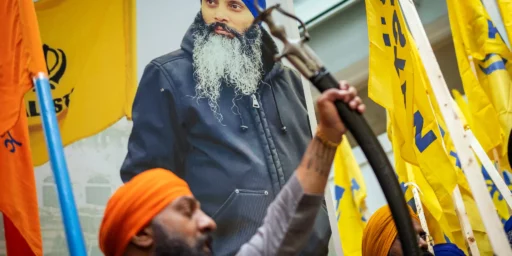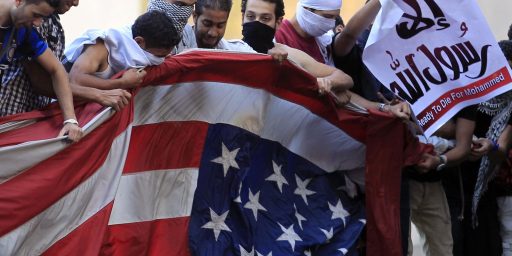New Terrorist Target: Iraqi Economy
UPI’s Claude Salhani offers a disturbing assessment of recent events in Baghdad.
The “war” in Iraq is suddenly taking a very different turn, and regrettably, not one for the better. After first targeting the military, then changing tactics by kidnapping hostages and holding them in exchange for the withdrawal of Coalition troops — and one may add with some success — the “insurgents” are now going after the soft underbelly of Iraq, its fragile economy.
A new rebel group, hitherto unknown, calling themselves the “Black Banners” is the latest to surface. They join the plethora of armed groups opposed to the presence of foreign forces, particularly American soldiers, in Iraq. The Black Banners have detained six hostages: three Indians, two Kenyans and an Egyptian, all nationals from “neutral” nations. The abducted men work as simple truck drivers for a Kuwaiti company. The kidnappers have threatened to behead one of their captives every 72 hours, beginning Saturday, if the Kuwaiti company does not agree to withdraw from Iraq by the set deadline.
The intriguing development in this new incident is that none of the countries involved in this latest round of abductions contribute troops to the U.S-led coalition serving in Iraq. Furthermore, the Black Banners abductors demand that the countries concerned — Kenya, Egypt and India — withdraw all their citizens from Iraq, and stop doing business with the Americans. This request may be somewhat complicated to initiate. As far as the Kenyans are concerned, withdrawing their nationals from Iraq should not be too difficult. There could not be too many Kenyans working in Iraq. But when it comes to the Egyptians and Indians, the issue becomes far more complicated. India, a country with the world’s second-largest Muslim population, after Indonesia, has long maintained excellent relations with Iraq. Even during Saddam Hussein’s rule and throughout the more than a decade of U.N.-imposed economic sanctions, the two nations maintained cordial ties. Currently, about 100,000 Indian workers are at any one time employed throughout Iraq, working in mostly menial jobs. Repatriating such huge numbers would require a monumental effort and would create an exodus of Biblical proportions, similar to the massive evacuation of foreigners that had to be undertaken after Iraq’s invasion of Kuwait in August 1990. Egypt, too, has most probably as many nationals working in Iraq, if not more. Most of them are also employed in low-paying jobs.So why would an insurgent group — purported to be acting in the national interest — demand the forced removal of people involved in rebuilding their country? One could only presuppose that having successfully pressured several nations, such as the Philippines, Spain and a number of Latin American states to withdraw their forces, the insurgents are now re-directing their efforts to undermine Iraq’s economy. The aim of such a move would be to push Iraq into an economic abyss, hoping that the United States’ post-invasion effort of rebuilding the country and “bringing democracy” would be guaranteed failure. Cripple the economy and the country comes to a standstill. The rebels may be applying the old communist theory that in order to “win,” they must first run the system into the ground. Why else would they demand the departure of people and businesses involved in reconstructing Iraq’s war-tattered infrastructure and frail economy? People with no ties to the “occupation forces.”
Of course, this presumes that these kidnappings are related and part of a greater plan. If that is the case, Salhani’s explanation is as plausible as any I’ve seen. Further, whether disruption of Iraq’s economy is a key goal of these terrorists, it is certainly a byproduct of their activity. There’s little doubt that the reconstruction effort has been set back significantly by the bombings, kidnappings, and other activities of these groups.



![Military Coup Underway In Egypt [Update: Morsi Deposed]](https://otb.cachefly.net/wp-content/uploads/2011/02/egypt-flag3-512x256.gif)

